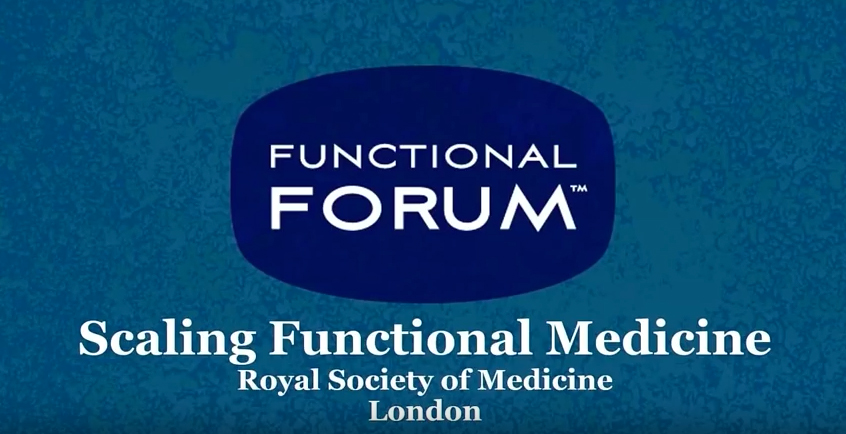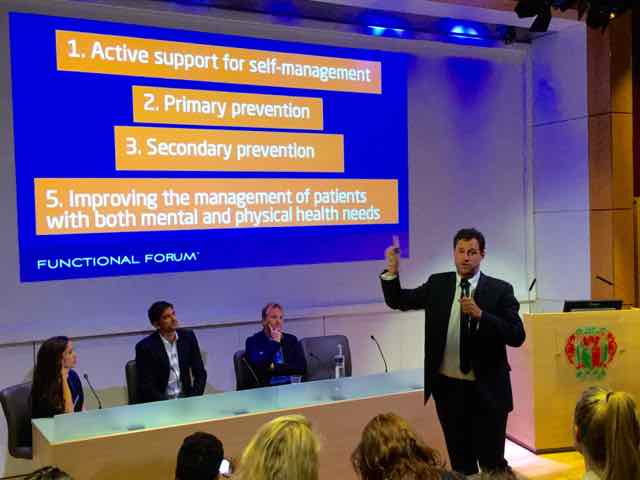By Rob Verkerk PhD, founder, executive and scientific director
A healthcare revolution is underway. It’s a global phenomenon, and people around the world are coming together to light the touch papers and ignite the movement. It involves natural health and much less reliance on drugs. It’s the type of revolution many have been working towards – and its central to the mission and vision we’ve long had at ANH.
Here are three markers that herald the initiation of the revolution:
Too much medicine
The British Medical Journal (BMJ) is something of an institution, being a wholly owned subsidiary of the British Medical Association (BMA). As one of the world’s premier medical journals, it manages to mix ingrained orthodoxy with progressive approaches. Fiona Godlee, the editor-in-chief, became highly conspicuous in alternative medicine circles when she hitched her wagon to that of Sunday Times journalist Brian Deer and became one of the leading medics challenging Dr Andrew Wakefield and the 12 other authors of the famous Lancet paper of 1998 that suggested a possible link between the MMR vaccine and autism. This is not the place to resurrect the debacle that ensued, save to say that we’ve covered our views on it many times, including here, here, here and here. With the fabric of the BMJ deeply woven into the bedrock of the medical orthodoxy, it’s highly significant that the journal has launched its Too Much Medicine campaign that “aims to highlight the threat to human health posed by overdiagnosis and the waste of resources on unnecessary care”. The campaign also highlights the risks of pharmaceutical overuse and abuse. Its aim is quite simply to “wind back medical excess, safely and fairly.” It’s more, rather than less, poignant that it’s the BMJ heading this campaign. That’s because the BMJ is the BMJ, and we’re confident the campaign will have a positive effect in the medium- to longer-term in reducing unnecessary pharmaceutical and surgical treatments, and not just in the UK and within the NHS.
Quality of healthcare delivery is deteriorating
A growing number of people are poorly served by their healthcare system. This is despite all the so-called ‘advances’ in modern medicine. Many factors contribute including lack of patient engagement, excessive focus on acute care, ineffective remedies for many chronic diseases, aging populations, more people living with metabolic diseases like type 2 diabetes and Alzheimer’s, focusing on disease treatments too late in the disease cycle and, among so many other things, lack of sufficient attention to disease prevention. The good news, among this gloom, is that the US National Institutes of Health recognises most if not all these issues, as does the UK NHS think tank, the King’s Fund.
The most recent King’s Fund Quarterly Monitoring report (May 2016) says that, “nearly two-thirds of NHS trust finance directors and more than half of clinical commissioning groups (CCG) finance leads say the quality of patient care in their area has deteriorated over the past year”. A staggering 3.7 million Britons are currently awaiting hospital treatment of one form or another. Identifying and recognising the multiple problems is a pre-requisite for finding solutions. The fact that the likes of the NIH and the King’s Fund have fairly and squarely put their fingers on at least some of the underlying problems – is a big step in the right direction.
Emerging solutions
The two markers above are about influential organisations and bodies recognising and identifying some of the key problems in healthcare. It’s when it comes to agreeing among a wide stable of healthcare professionals what form the solutions should take that the trouble starts. Why is it so hard to find consensus?
One of the big issues is that people with influential views don’t always know what they’re talking about. Views on what constitutes an appropriate diet or a healthy lifestyle is a good case in point. The US myplate and the UK’s eatwell guide are examples of what the US and UK governments think we should eat.
Why is it that independent scientists from Harvard, or for that matter scientists at ANH, think those diets might contribute to, rather than resolve, chronic diseases? In his nail-on-the-head blog on the subject of the low carb revolution, UK health journalist Jerome Burne this week alludes to the mainstream advice being more than just a little influenced by Big Food. He also believes we might be witnessing a seminal moment in medicine — a trigger point — in which a shift away from low fat and towards low carb could yield considerably greater successes with the plethora of chronic disease challenges we currently face than any drug intervention. The reason this shift might be ‘stickier’ than previous dietary fads is this one has a growing group of doctors behind it. As Jerome says, it would be ignored if it was just nutritionists rallying behind it – but doctors are different.
Yet, as the National Obesity Forum wobble last week suggests, consensus may not yet have been achieved, but let’s not forget that was less to do with a divide on macronutrient ratios and more to do with poor management of communications. Also, a one-size-fits-all approach will never work for everyone because our physiologies, genetics, microbiomes and environments are all unique.
One of the shining lights in the movement towards healthcare reform is a rapidly expanding virtual organisation that calls itself the “world’s largest integrative medicine conference”. It’s called the Functional Forum and there are no prizes for guessing the all-important hashtag (answer: #functionalforum).
On the first Monday of every month, a forum is held somewhere and broadcast to any healthcare practitioner that elects to register and tune in. James Maskell, co-founder of the Functional Forum, calls it “medutainment” and it brings together the latest health news and views on research and practice development and health technology in an inspiring, accessible, upbeat and entertaining way.
From left to right: Guest functional medicine doctor from Egypt, Dr Rangan Chatterjee, Mike Ash, James Maskell
What’s more, you can watch past forums via the Functional Forum’s youtube channel.
Grab a herbal tea, and absorb the fascinating presentations made by James Maskell (who takes into account in his presentation the King’s Fund framework I pointed him to), Dr Rangan Chatterjee (for insights about what really happened during and after the ‘Doctor in the House’ series on BBC TV) and Mike Ash (for a whirlwind tour of the human superorganism) at the 1 June Functional Forum meeting in London. It was the first forum to be held outside the USA, and, suitably, it was held in the Royal Society of Medicine, the world’s oldest medical institution.
We were delighted to have been in attendance at the forum – the buzz was electric! At the networking session that followed the talks, there was a fantastic opportunity for practitioners to come together and find ways of collaborating, to learn how they might better transform their practices.
Changing the legal and scientific framework for healthcare
The infrastructure shifts that are required to support the transition in health we’re convinced is already on its way requires some big changes to be made. Here are just a few, the first three being key take-homes offered by James Maskell at last week’s Functional Forum:
- Create provider teams of healthcare professionals in which involve collaborations doctors, health coaches, nutritional and CAM therapists, personal trainers, yoga and meditation teachers and other types of relevant health professional
- Create group structures for patients (although we recognise this is not a good term given its etymology and link to the notion of suffering) in which patients are given much more time to learn both from each other but also from health professionals about interventions and dietary and lifestyle modifications that have been found to be effective
- Use of empowering and informative technology to both monitor and motivate. There is rapidly increasing amount of tech out there that can help to monitor blood glucose, body composition, physical activity, sleep patterns – and so much more. Use it!
- Re-interpreting the mechanism of healing. Since the era of Pasteur, many have got used to thinking of diseases as alien processes that need to be attacked and wiped out, be it by chemical, surgical or radiological means. We forget that it’s the body that does the healing in its ongoing quest to find equilibrium and resilience. We need simply to provide the best resources to allow this complex superorganism, in which human cells are outnumbered by microorganisms by over 10 to 1, to rediscover its balance points. While we think of homeostasis as this balance point, it’s actually a dynamic rather than static process so we would do rather better to refer to it as homeodynamics.
- Resilience = optimum health. We’ve got to move away from thinking of disease states as the places where interventions should start. That’s because many diseases, and the ones that create the greatest burden on healthcare systems namely chronic ones, typically manifest over many years. We should be putting more effort into looking for markers that signify a loss of resilience, which typically precedes both clinical and even pre-clinical symptoms of disease. Real health and vitality should therefore be seen as the way in which we respond to stressors, be they physiological, chemical, microbiological, emotional or psycho-social, as opposed to the absence of disease. There are many developments occurring in such areas, but interest in the clinical application of this is presently much greater in functional and integrative medical communities than it is in mainstream ones.
- Observation. Medical science is one of the few scientific disciplines to relegate observation to the bottom of the pile of what we should take into account when we make medical decisions. At the top of the pile are of course Randomised Controlled Trials, or RCTs, or systematic reviews or meta-analyses of these. But RCTs bare little resemblance to the multiple interventions or dietary or lifestyle choices that occur in the real world. Outcomes are everything, yet medical doctors are trained to follow conclusions drawn from a blinded RCTs in which a range of factors we know to be important influences in health and disease have been factored out. Imagine an astronomer having to ignore what he or she sees through a telescope? The doctors who have made up their minds about the advantages of reducing carbs in their diets are doing it because they’ve seen the results. The same process is driving the grassroots popularity of the low carb or Banting movements.
- Legal change in the definition of a medicine. Currently under EU law, any substance that is used to treat or prevent disease ad that modifies, corrects or restores physiological functions by exerting a pharmacological, immunological or metabolic action is a drug. Unless it is “clearly” a food. Most definitions of a medicine in other territories share these similar principles – and they are legal instruments that have been carved out by and for the drug companies over the last half century (the thalidomide disaster providing the original trigger for regulation). The difficulty is that the borderline between foods and drugs is getting ever thicker and more blurred. The law thus arms government regulators with a loaded gun they can fire arbitrarily. And you should know they use the gun regularly – through our sister organisation ANH Consultancy we spend a good deal of time deflecting bullets and protecting products.
Call to action
Our advice to the public is to find practitioners who support these kinds of shifts – as they will be riding the crest of the wave of the healthcare revolution.
Practitioners? Increasing numbers are already heeding these approaches. Like Dr Rupy Aujla, you can choose to be inspired to be an inspiration. Ideally be both!
Let’s help the revolution gather pace. The time is now.









Comments
your voice counts
09 June 2016 at 1:42 am
This sounds all encouraging ... and I hope that this movement will get more and more strength and people recognise that they are not helpless victims in a health system which ONLY gives people more "poison" for their bodies ... and a blurred mind.... that they can do something to support themselves and are supported.
09 June 2016 at 8:50 am
Great summary - one small statistical correction, the ratio of bacterial cells to human cells quoted here as 10:1 is incorrect, rather best say we are outnumbered... the ratio could be anywhere between 2:1 and 100:1? http://www.sciencealert.com/bacteria-cells-don-t-actually-outnumber-human-cells-in-our-bodies-study-finds
Your voice counts
We welcome your comments and are very interested in your point of view, but we ask that you keep them relevant to the article, that they be civil and without commercial links. All comments are moderated prior to being published. We reserve the right to edit or not publish comments that we consider abusive or offensive.
There is extra content here from a third party provider. You will be unable to see this content unless you agree to allow Content Cookies. Cookie Preferences